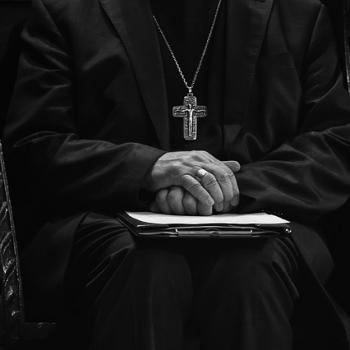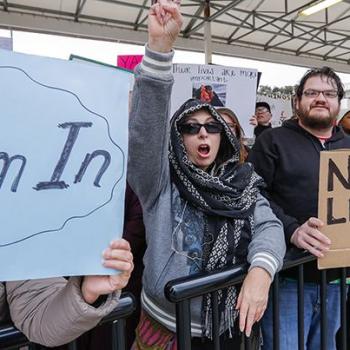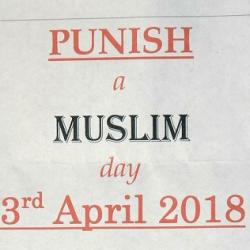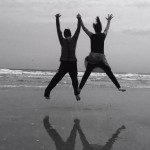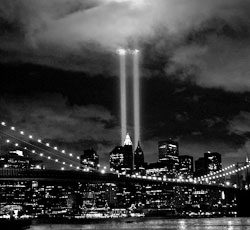 (Editor’s Note: This is a guest post from Rabiah Ahmed, director of Mirza PR and board member of My Faith My Voice.)
(Editor’s Note: This is a guest post from Rabiah Ahmed, director of Mirza PR and board member of My Faith My Voice.)
I knew from an early age that I wanted to work on behalf of the American Muslim community. My passions for community organizing, writing, and Islam led me to pick majors in college that I knew could help share the stories and perspectives of Islam and Muslims in America. (I graduated from Wayne State University in Detroit, Mich., with a bachelor’s degree in mass communication and UNC-Chapel Hill with a master’s degree in print journalism).
But little did I know how the events of that fateful September morning 10 years ago would change my chosen career path to a near necessity. Islam, Muslims, and people that “look” like Muslims were at the forefront of the news in an unprecedented way. All of a sudden, everyone was an expert on Muslims and Islamic ideologies. Many of these self-appointed experts expounded did not hold unfavorable views of Muslims based on their personal beliefs.
For those who had never heard about Islam or did not know any Muslims, it was their first encounter with what many labeled a mysterious faith and backwards community. For the American Muslim community, who had lived a relatively comfortable life, it found itself on the defensive — rushing to refute false allegations, correct inaccurate portrayals, and balance unfair comparisons.
So for better or for worse, myself, and many countless others across the country have since then worked to better enhance understanding of Islam and share a more realistic depiction of the American Muslim community. Below, I share some of the lessons learned and achievements we have collectively experienced from an American Muslim perspective.
What are some of the lessons learned?
First, American Muslims can no longer risk living insular lives. While there were some organizations dedicated to interfaith work pre-9/11, the rest of us really had to rush to make up for lost time and had to quickly work on ways to engage others of different faith backgrounds in real, meaningful ways.
Second, sometimes protesting gives undeserving people platforms. We’ve had to endure the Qur’an burning pandemonium, the Muhammad cartoon controversy, and a host of other events that tested our community. We’ve learned that we empower those who unfairly attack us when we give them too much attention (especially if they didn’t have a platform before) and we’ve learned that sometimes the strongest response is no response at all.
Third, people often react to the unknown with fear. Understanding this can help ease interfaith tensions. While logical responses have their place, so do compassion and empathy for people with negative opinions. Many in America unfortunately still fear Islam and Muslims due to lack of familiarity. In some instances, offering them kindness and patience can make a world of difference.
Fourth, we’ve learned the importance of being proactive, not reactive. No sustained effort of integrating Muslims into the fabric of American society can take place if we spend all our time merely reacting to what others say. Besides, why should others define the conversations that take place about our faith and community?
Fifth, we’ve learned to look inside our communities and recognize problems and take steps to deal with them. Our communities suffer from many of the same ills as other communities, and it’s in our best interest not to ignore them or deny that they exist.
Sixth, we’ve learned a lot about our own religion. Or perhaps, we’ve learned the importance of learning our own religion. Because Islam has no one central authority, it’s often hard for people – Muslim and non-Muslims alike – to know who speaks for Islam. And Islam is not a monolith, either. So it has become necessary for us, as Muslims, to know our own religion, and to connect to its embrace of diversity and its tolerance of plurality.
What did we do right?
We’ve understood the importance of diversifying our careers, especially in the fields of law, mass communication, and politics. These areas of expertise help shape the national conversations about people and issues of the day. Our voice was relatively absent before 9/11 but that is slowly changing.
We’ve created opportunities and platforms for Americans of all faiths to engage with each other and learn from one another. Mosques across the country have opened their doors to interfaith events and Muslim organizations have launched many campaigns encouraging its community members to be civically engaged.
We’ve built stronger interfaith alliances, underscoring the similarities between all faiths while respecting our differences. American Muslim leaders have met with national religious leaders from variety of congregation to help promote trust and partnership.
We’ve partnered up with other faith-based and minority communities on issues of common concern, such as the environment, healthcare and education.
We’ve invested in conducting research on attitudes and surveys that create empirical data to gauge who we are, how we think, and how we can improve as a community and as a nation.
We’ve helped create many different resources (websites, documentaries, books, magazines, speaker’s bureaus) that people can turn to for an accurate understanding of Islam.
We’ve come out consistently and collectively against terrorism and extremism so that it is clear where we stand on these issues.
We’ve encouraged engagement with the entertainment industry, working with producers and writers to ensure diversity and accurate portrayals of our community both on small and big screens.
What’s Next?
So, the question remains, how do we move forward? Naturally, we learn from the lessons of the past and build on our successes, but perhaps more simply, we just need to take the time and effort to get to know one other in real ways.
We don’t always need to rely on major interfaith events or nationwide campaigns to help us break down barriers or give us a reason to work together.
We really need to take the time to get to know our neighbors, our colleagues, our classmates, and work with each other to make positive contributions to society.
Reaching out to America and helping it uphold its values of religious freedom, diversity and equality are not some far, unattainable goals. We, as individuals, make up this beautiful county and define on a regular basis who we are and what we want it to be.
I, and my American Muslim counterparts, look forward to working with people of all faiths to finding solutions to the challenges facing our country and helping to make it stronger and more beautiful with every passing year.
–Rabiah Ahmed is the director of Mirza PR and board member of My Faith My Voice


